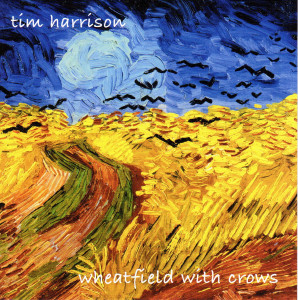 Lenora Rose contributed this review.
Lenora Rose contributed this review.
Tim Harrison is a classic guitar playing singer-songwriter, with several obvious merits; he’s a tuneful singer with a pleasant voice, and a decidedly skilled guitar stylist. There’s Spanish and classical guitar technique here if I’m not mistaken, and considerably more going on than the strumming of chords. He also chooses superlative backing musicians: a harpist who gets her instrument so involved with counterpointing the guitar line that I usually don’t catch her arrival until a measure in or more; a harmonica player who sometimes runs overboard but definitely injects a bit of his own mood into things; some understated and elegant backing vocalists. The production is crisp and professional, even slick.
There’s also a deep heart here, best evidenced in the two tracks which did win me over, the title track and “Joy Alright.” “Wheatfield with Crows” is a striking rumination about the end of friendships, and a little about the end of life. Aside from the unforgivable attempt to rhyme “Moved” and “Pas-de-deux” (which lyrical evil is not repeated anywhere else on the album – the other rhymes are at least close enough to be comfortable), this song has everything going for it; depth in the lyrics, and music melded to the theme and tone of the words. The mood is at best melancholic, but powerful.
“Joy Alright” is about striving for the brightness in life in the face of the pain, and it’s a splendid song, which sold itself to me by bypassing my brain and grabbing my heart directly. (Though even the mind concedes that it has a good melody and reasonably solid lyrics, and is well arranged, though the harmonica is a bit excessive). Still, there’s enough heart in the song that it alone makes the album worth hearing again.
The problem is, most of his endeavours simply don’t resonate with me. It’s like listening to a well-performed sermon for a religion not your own, or a fierce political speech that you simply don’t agree with. I admire the skill, I feel the passion he’s obviously put in. I can’t bring myself to love the results.
“Home Boys,” a story of Irish Immigrants and forced labour, struck me as yet another song about past injustice. I am not indifferent to the crimes of the past, and I do not wish to ignore the horrors of history, or the truth that similar horrors are being repeated even now. Yet the music feels cribbed from any of a dozen other singer-songwriter efforts of like kind. The rhymes limp, and for all the multiple images of forced labour, greed, squalour, and the gap between rich and poor, I get no sensation of real anger or inspiration.
Likewise for “Innocent Eyes,” the weakest song, which also is marred by a remarkably whining chorus. The softer “Elizabeth’s Lament” feels more sincere, and more personal. “Where Home Boys” is about a universal horror, the pain is too unfocused. “Elizabeth’s Lament” focuses on an individual’s crushed spirit, and by focusing more particularly on one character, brings that character into vivid life, and the song with it.
“The Parting Letter to Ophelia” tries a similar technique, with characters who are themselves familiar to us from Shakespeare. I can’t help feeling that the song would be better if the source of inspiration were better hidden, and Ophelia’s name removed from the lyrics. The words are powerful on their own, but the reference to the play distracts from listening to the music; I’m comparing what he says here to what is said and implied in the play, instead of judging Tim Harrison by his own creation. In addition, both lyrics and music are simply too modern to fit any traditional conception of Hamlet.
The next song cribs from Poe and Shakespeare to make a bright and upbeat love song. The change of mood is good, and I find myself enjoying the song – even though the plonking guitar and the harmonica harken back to a particular branch of the folk revival that I don’t like in large quantities. It’s simply too cheerful to entirely deny.
I love the Yeats poem “Song of the Wandering Aengus,” but this melody and arrangement drag it straight to earth. The music was written by Joni Mitchell and Dave Van Ronk, so I can’t really blame Harrison for the way the tone of it seems to clash with the tone of the poem. Yet his performance also has too much of a mundane this-world feel; I could never believe this singer encountered something from Faerie, or truly felt the mix of love and doom that drove him to wander all his life in pursuit.
For all I recognize, intellectually, that Tim Harrison is trying to put himself into these songs, and reach out to his audience, I’m not the audience he’s reaching for. All the guitar virtuosity in the world, and all the emotion, can’t do more than warm me to him. It’s good, and I can appreciate it, and I can certainly suggest that he deserves an audience that is more than just appreciative. The audience isn’t me, but I wish him well.
(Second Avenue Records, 2002)
